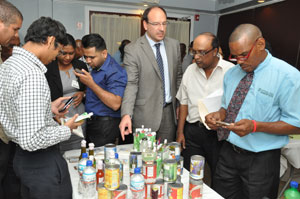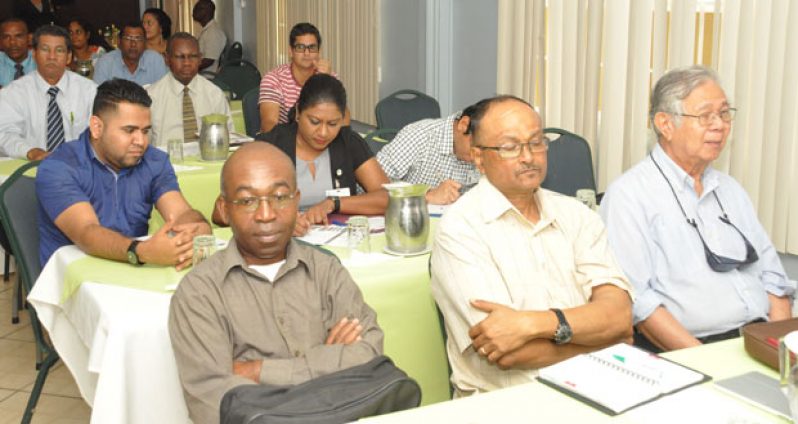CARIBBEAN Agricultural and Research Development Institute (CARDI) and the International Trade Center (ITC) Thursday and Friday last engaged local producers of coconuts and coconut products in a consultation on a future direction for the industry locally and regionally .The consultation aimed at obtaining their inputs for a dynamic and responsive plan with actionable steps for benefiting from the growing world-wide demand for coconuts and coconut products.
The consultation is an integral part of a European Union (EU) funded programme for re-positioning and development of the coconut industry within the Caribbean, with Guyana being one of nine countries which are beneficiaries.
The launch of the Guyana leg consultations took place on Thursday last at the Grand Coastal Hotel, East Coast Demerara, under the theme : “Re-positioning the coconut industry within nine Caribbean countries for restoration and sustainable development.”

Those present included top officials of CARDI and the ITC, a representative of the New Guyana Marketing Corporation (NGMC), Senior Agricultural Officers, including the Permanent Secretary of the Ministry of Agriculture Mr George Jervis, NAREI, the Guyana School of Agriculture (GSA) the Food and Agricultural Organisation (FAO) the Caribbean AgriBusiness Association (CABA) , the Guyana Bank for Trade and Industry (GBTI) the Inter American Institute for Cooperation in Agriculture (IICA) and the EU, among others .
Speakers at the launch included Dr Homenauth, CARDI’s Technical Services Manager Dr Francis Asiedu, ITC Representative and Head of Product Sector Development Mr. Matias Urrutigoity, PS Jervis and EU Ambassador Robert Kopecky.
In welcoming remarks, Dr Homenauth said that the development of the industry has to be market driven.
He noted that given the diffusiveness of the coconut market regionally, it will have to be driven by international sources that can fuel demand and ensure its vibrancy.
He stressed that the ability of the sector to be competitive can be facilitated by the individual creativity of producers, inputs from scientists and technicians, as well as a Central Guiding Coconut Authority in each of the nine participating countries, each funded by a regional coconut Industry Development Agency.
Permanent Secretary George Jervis said that the coconut had come a long way from the abusive rhetoric of “scientists” who had described consumption of its products as threats to human health.
He noted that coconut production locally had increased from five million tonnes in 2010 to ten million four hundred and seventy tonnes in 2014, with exports going to all of the major countries.
He supported the need for an active coconut steering committee in each country, plus regional steering committees formed from an elected representative from each of the active local steering committees to ensure that all the necessary work is implemented and monitored.
He expressed hopes that a fully developed road map for market development for the sector will make the local and Regional industry stronger and more competitive with other coconut products from any other part of the world.
EU Ambassador Robert Kopecky emphasised that the EU development policy recognised the major role of agriculture for poverty reduction and inclusive growth.
He observed that between 1950 and 1980, the coconut industry constituted an important sectoral activity in agricultural and rural development in Guyana and in the Caribbean Region, but collapsed due to pest and disease issues.
He added: “Coconut is making its come back and demand for products such as coconut water, milk and oil has seen a boom not only in this region, but all over the world.”
He stressed that the road-map consultation offered a good opportunity to discuss – through a participatory process – priorities to improve the profitability of the sector, its productivity and its long term sustainability.
He said that the funding for the project is fully integrated in the EU’s development cooperation, in line with its continuing support for decent work, human rights and social protection.
Resource persons Dr Asiedu of CARDI and Mr Urrutigoity of ITC briefed participants on the history of the project and the expectations of the organisers before the start of the discussions .
The Guyana leg of the consultations ended yesterday.
By Clifford Stanley
***Saved as officials
Caption: –
***Saved as locally
Caption: –



.jpg)








